Part 2 : A study of psychology
Prominent figures in psychology
In our first article, we followed Bishop Fulton Sheen’s analyzes on the fields of psychology and psychiatry, which he presented through a Christian perspective. Early psychologists will be the subject of this second treatise. We have placed them in order of date, to give our readers a clear view of how psychology was formulated through theories and ideas.
The history of psychology could bring us to the conclusion that scientific credibility is not very likely in this field, especially when the belief in God is eliminated. Psychologists themselves admit that their methods are basically trial and error, in other words, guesswork.
The influence of Nietzsche
 Friedrich Nietzsche influenced many of the ideas of both early and modern psychologists. He was born in 1844, the son of a Lutheran pastor. Rejecting his father’s faith, Nietzsche became a lifelong rebel against Christianity; he believed instead that all life evidences a will to power. Hopes for a higher state of being after death were explained by Nietzsche as compensations for failures in this life.
Friedrich Nietzsche influenced many of the ideas of both early and modern psychologists. He was born in 1844, the son of a Lutheran pastor. Rejecting his father’s faith, Nietzsche became a lifelong rebel against Christianity; he believed instead that all life evidences a will to power. Hopes for a higher state of being after death were explained by Nietzsche as compensations for failures in this life.
His statement on the death of God can be interpreted religiously or atheistically: “God is dead. God remains dead. And we have killed him... What was holiest and most powerful of all that the world has yet owned has bled to death under our knives: who will wipe this blood off us?” (in Die Frohliche Wissenschaft, 1882). This now famous quote about the “death of God” resulted from his observations of the movement from traditional beliefs to the trust in science and commerce.
Nietzsche dissected Christianity as a faith of the “little men,” where excuses for weakness are paraded as moral principles. According to Nietzsche, instead of worshipping God, man should concentrate on his own elevation. He argued that no single morality can be appropriate to all men. Indeed, one could say Nietzsche’s ideas nullified all morality.
The founders of psychology
Benjamin Rush 1746 – 1813
 Benjamin Rush was among those who signed the Declaration of Independence. He was Dean of the Medical School at the University of Pennsylvania and called the “Father of American Psychiatry.” He described Negroes as suffering from an affliction called Negritude, which he theorized to be a mild form of leprosy. He taught that the only cure for the “disorder” was to become white.
Benjamin Rush was among those who signed the Declaration of Independence. He was Dean of the Medical School at the University of Pennsylvania and called the “Father of American Psychiatry.” He described Negroes as suffering from an affliction called Negritude, which he theorized to be a mild form of leprosy. He taught that the only cure for the “disorder” was to become white.
Using this “disease” as the reason for segregation, Rush drew the conclusion that “Whites should not tyrannize over [blacks], for their disease should entitle them to a double portion of humanity. However, by the same token, whites should not intermarry with them, for this would tend to infect posterity with the ‘disorder’… attempts must be made to cure the disease.” His theories helped to cement the idea that slavery was the only method of curing this “disease,” and that a “treatment” of harsh manual labour was actually a favour that those supposedly higher intellects gave to the Negro. Ironically, even today, Rush’s portrait adorns the official seal of the American Psychiatric Association.
Wilhelm Wundt 1832 – 1920
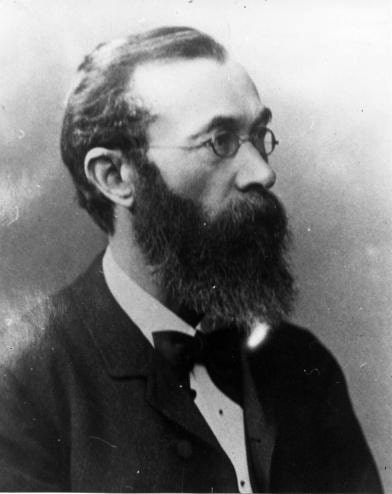 In 1897, Professer Wilhelm Wundt of Leipzig University in Germany used experimental psychology to promote his theory that man did not have a soul. He said that his idea was built on the fact that a soul could not be measured with scientific instruments, therefore it (the soul) did not exist. According to Wundt, the animal sensation/reaction towards stimuli is the same as that of humans. Wundt has a now famous quote that states: “Man is a stimulus-response and soulless animal.”
In 1897, Professer Wilhelm Wundt of Leipzig University in Germany used experimental psychology to promote his theory that man did not have a soul. He said that his idea was built on the fact that a soul could not be measured with scientific instruments, therefore it (the soul) did not exist. According to Wundt, the animal sensation/reaction towards stimuli is the same as that of humans. Wundt has a now famous quote that states: “Man is a stimulus-response and soulless animal.”
Because of his efforts to denigrate life, his work had a major influence on the spread of the idea that man could kill each other easily and without remorse. Because he theorized that the human person is really an animal, then there are no moral restrictions to any kind of evil behaviour. “… it truly appears to be a useless waste of energy to keep returning to such aimless discussions about the nature of the psyche…” Wundt’s theories were taken up by many other psychologists of the day, including Ivan Pavlov, Herbert Spencer and Ernst Rudin. His work was also instrumental in establishing the radical eugenic ideas of Adolf Hitler.
G. Stanley Hall 1844 – 1924
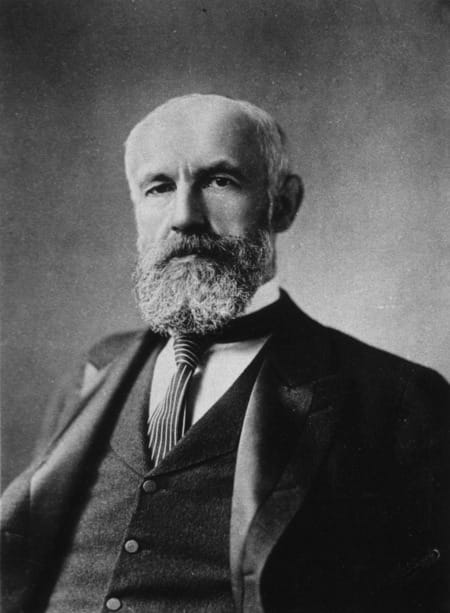 Darwin’s theory of evolution had a large influence on G. Stanley Hall’s career. His work delved into controversial portrayals of the differences between women and men, as well as the concept of racial eugenics. Hall was born into a religious family, but when questioned whether his studies had made him more or less devout, Hall replied, “Less...” In 1887, Hall theorized that Africans, Indians and Chinese were members of “adolescent races” in a stage of “incomplete growth.” Thus, he believed that psychology should intervene and save them from the “liabilities and dangers of freedom.”
Darwin’s theory of evolution had a large influence on G. Stanley Hall’s career. His work delved into controversial portrayals of the differences between women and men, as well as the concept of racial eugenics. Hall was born into a religious family, but when questioned whether his studies had made him more or less devout, Hall replied, “Less...” In 1887, Hall theorized that Africans, Indians and Chinese were members of “adolescent races” in a stage of “incomplete growth.” Thus, he believed that psychology should intervene and save them from the “liabilities and dangers of freedom.”
Hall had no sympathy for the poor, the sick or those with developmental differences or disabilities. A firm believer in selective breeding and forced sterilization, Hall believed that any respect or charity toward those he viewed as physically, emotionally, or intellectually weak or “defective” simply interfered with the movement of natural selection toward the development of a super-race. Hall’s vision was a socialism of the right, a blueprint for the future German National Socialism that arose just a few years after his death.
Sigmund Freud 1856 – 1939
 Freud was born in Freiberg, Moravia in 1856. In 1885-86, Freud spent the greater part of a year in Paris, where he was deeply impressed by the work of the French neurologist Jean Charcot, who was at that time using hypnotism to treat hysteria and other abnormal mental conditions. Freud experimented with hypnosis often afterwards, although he later discarded the practice.
Freud was born in Freiberg, Moravia in 1856. In 1885-86, Freud spent the greater part of a year in Paris, where he was deeply impressed by the work of the French neurologist Jean Charcot, who was at that time using hypnotism to treat hysteria and other abnormal mental conditions. Freud experimented with hypnosis often afterwards, although he later discarded the practice.
Freud was arguably the first thinker to apply deterministic principles systematically to the sphere of the mental, and to hold that the broad spectrum of human behaviour is explicable only in terms of the (usually hidden) mental processes or states which determine it. Freud put a lot of the significance to slips of the tongue or pen, obsessive behaviour and dreams – all, he theorized, are determined by hidden causes in the person’s mind, and so they reveal in covert form what would otherwise not be known at all.
According to Freud’s theories, freedom of will is, if not completely an illusion, certainly more tightly circumscribed than is commonly believed, for it follows from this that whenever we make a choice we are governed by hidden mental processes of which we are unaware and over which we have no control. This idea conflicts greatly with the Christian view of the human being, which says that God created all of us with a free will, which is respected even by the Creator Himself. Freud himself saw spiritual belief as superstition and called it the “universal obsessional neurosis.”
He also envisioned the slow disintegration of the Church through the application of psychiatry: “The scientific spirit brings about a particular attitude towards worldly matters; before religious matters it pauses a little, hesitates, and finally there too crosses the threshold. In this process there is no stopping; the greater the number of men to whom the treasures of knowledge become accessible, the more widespread is the falling-away from religious belief – at first only from its obsolete and objectionable trappings, but later from its fundamental postulates as well.”
It is undeniable that Freud gave sexual drive an importance and centrality in human life, actions and behaviour in a way that is truly unnatural. He argued that while the sexual drives can be discerned in children from birth (the theory of infantile sexuality), sexual energy (libido) is the single most important motivating force in adult life.
Criticism about Freud’s theories has also been generated by the confusion arising out of his long-standing addiction to cocaine. It stands to reason that theories based on the confused mind of a drug addict should cause some motivation for doubt and should be studied with caution or even discarded out of hand. We may add that there has been no discriminate study of the validity of Freud’s theories and their relation to his cocaine addiction.
One important fact to note is that Freud was permitted to leave Austria during the Nazi occupation, even though all of the other members of his family were detained in concentration camps. His connections with government officials were obviously brought to personal advantage. In September of 1939, Freud prevailed on his doctor and friend, Max Schur, to help him to commit suicide with an overdose of morphine. His daughter Anna, who was also a psychologist and later was instrumental in the promotion of Freud’s work, assisted in the procedure.
Alfred Adler 1870 – 1937
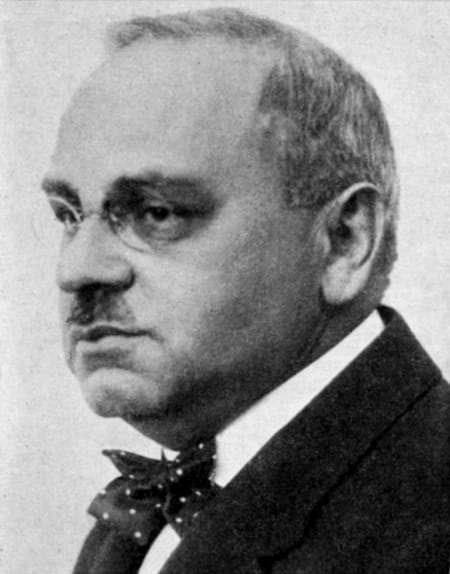 In collaboration with Sigmund Freud and others, Adler was among the co-founders of the psychoanalytic movement. He was also a core member of the Vienna Psychoanalytic Society. He was the first major figure to break away from psychoanalysis to form an independent school of psychotherapy and personality theory.
In collaboration with Sigmund Freud and others, Adler was among the co-founders of the psychoanalytic movement. He was also a core member of the Vienna Psychoanalytic Society. He was the first major figure to break away from psychoanalysis to form an independent school of psychotherapy and personality theory.
Adler advocated for a holistic approach, which means viewing the individual holistically rather than reductively, the latter being the dominant lens for viewing human psychology. Adler was also among the first in psychology to argue in favor of feminism making the case that power dynamics between men and women (and associations with masculinity and femininity) are crucial to understanding human psychology (Connell, 1995).
In a later work, Social Interest: A Challenge to Mankind (1938), Adler turned to the subject of metaphysics, where he integrates Jan Smuts’ evolutionary holism with the ideas of teleology and community. Unabashedly, he argues his vision of society: “Social feeling means above all a struggle for a communal form that must be thought of as eternally applicable... when humanity has attained its goal of perfection... an ideal society amongst all mankind, the ultimate fulfillment of evolution.”
Alder said, “I see no reason to be afraid of metaphysics; it has had a great influence on human life and development. We are not blessed with the possession of absolute truth; on that account we are compelled to form theories for ourselves about our future, about the results of our actions, etc. Our idea of social feeling as the final form of humanity – of an imagined state in which all the problems of life are solved and all our relations to the external world rightly adjusted – is a regulative ideal, a goal that gives our direction. This goal of perfection must bear within it the goal of an ideal community, because all that we value in life, all that endures and continues to endure, is eternally the product of this social feeling.”
This social feeling, theorized Adler, is a community feeling whereby one feels he or she belongs with others and has also developed an ecological connection with nature (plants, animals, the crust of the earth) and the cosmos as a whole. Clearly, Adler himself had little problem with adopting a esoteric (occult) type of spirituality to support his theories.
Ernst Rudin 1874 – 1952
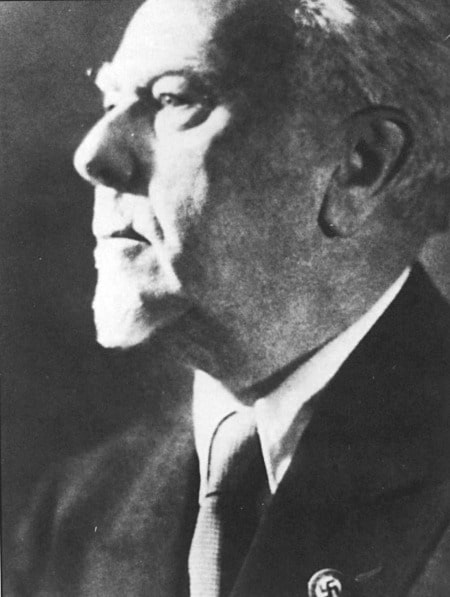 Ernst Rudin was a German psychiatrist at Munich University. He is described as “one of the most evil men in Germany,” and the chief architect of the Nazi’s racial hygiene program. Before Hitler, he started a campaign to purge Germany of its “unfit stock” as early as 1916. He claimed that psychiatry should take a major role in purifying the race which, he said, involved ensuring that genetically “defective” persons shall not be able to procreate.
Ernst Rudin was a German psychiatrist at Munich University. He is described as “one of the most evil men in Germany,” and the chief architect of the Nazi’s racial hygiene program. Before Hitler, he started a campaign to purge Germany of its “unfit stock” as early as 1916. He claimed that psychiatry should take a major role in purifying the race which, he said, involved ensuring that genetically “defective” persons shall not be able to procreate.
Rudin was president of the International Federation of Eugenic Organizations and a world leader of the eugenics movement which sought to remove “inferior” individuals from society by segregation, sterilization, or death in order to create a “better” race.
In 1916, he established the field of “psychiatric hereditary biology” which became “psychiatric genetics” in the 1930s, and which has subsequently been used to justify the efforts towards the mass destruction of unwanted ethnic groups around the world.
In 1933, Rudin was chosen by Hitler’s Reich Ministry to lead Germany’s racial purity program. Rudin wasted no time in drafting the Nazi Sterilization Law which originally called for the sterilization of “schizophrenics,” “alcoholics” and “manic-depressives” – all the subjects of Rudin’s “research.” As these legal sterilizations began, programs were already underway to sterilize “black” Germans. The sterilization program expanded to include many different cultures including Poles, Gypsies, Russians, Ukrainians and countless others. In the words of Rudin, these people were “inferior race types” that were to be exterminated at will.
Rudin’s program led to the establishment of a pilot-killing program at several of Germany’s psychiatric hospitals. The first inmates to die were 375,000 mental patients. Rudin publicly praised Hitler for making his “more than thirty-year-old dream a reality” by imposing “racial hygiene” upon the German people. Rudin admitted that when the killing program was started, he had not been informed, “because it was not thought right that I should have such a matter on my conscience.”
“The significance of Rassenhygiene [racial hygiene] did not become evident to all aware Germans until the political activity of Adolf Hitler. It is only through his work has our thirty-year long dream of translating Rassenhygiene into action finally become a reality,” stated Ernst Rudin.
“Whoever is not physically or mentally fit must not pass on his defects to his children. The state must take care that only the fit produce children. Conversely, it must be regarded as reprehensible to withhold healthy children from the state.” Ernst Rudin said in a speech to the German Society for Rassenhygiene, quoting Hitler.
Carl Gustav Jung 1875 – 1961
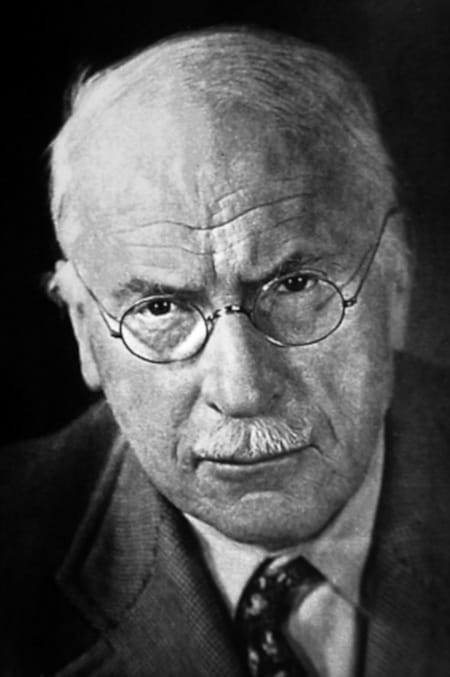 Even more than Freud, Jung has inspired the New Age movement with his interest in occultism, Eastern religions and mythology. “My situation is mirrored in my dreams,” Jung wrote in 1898 in his diary. With his cousin Helene (“Helly”) Preiswerk, he conducted esoteric experiments.
Even more than Freud, Jung has inspired the New Age movement with his interest in occultism, Eastern religions and mythology. “My situation is mirrored in my dreams,” Jung wrote in 1898 in his diary. With his cousin Helene (“Helly”) Preiswerk, he conducted esoteric experiments.
His first published paper, Zur Psychologie und Pathologie sogenannter occulter Phanomene (On the Psychology and Pathology of So-Called Occult Phenomena), appeared in 1902 and formed the basis for his doctoral thesis. Its material was partly based on his observations with Helene, whom he described in the work as “a young girl somnambulist.”
In 1938 he went to India and discussed his theories with Subrahmanya Iyer, the guru of the Maharajah of Mysore. In his thesis, Jung had a large scroll showing Shiva on top of Mount Kailas.
In 1937, Jung made a pronouncement about Adolf Hitler: “He is a medium. German policy is not made; it is revealed through Hitler. He is the mouthpiece of the Gods of old... He is the Sybil, the Delphic oracle.”
Conclusion
Throughout history, psychology has given us theories in a manner that seems to say that the field should be viewed and studied with respect. Indeed, some of the theories that a few psychologists have presented have common sense and can benefit humanity. The study of the human person is an important one and should not be neglected. However, this is IF it is conducted in a manner in coherence with the dignity of the human person and the teachings of the Catholic Church in mind.
However, if we can see that a psychologist is seriously maladjusted in his character, if he has had adherence to the occult or to chronic drug use; if he promotes and advocates racism, murder, racial “cleansing” and the belief that man is only an animal, etc., how can anyone possibly come to the logical conclusion that there is any credibility involved in this?
Man, in his search for the truth that comes from God alone, must make a discernment based on his own intellect and on the inspirations that God gives him through grace. If a theory, no matter how it is presented, does not conform to the just order that God gave to us, then it must be studied with a critical eye and then discarded as being unworthy of notice.
Those who study the human person should do so with the Christocentric ideology in mind. He, who is the Creator of the universe, has given to us the tools we need. He has given us an intellect, will and ingenuity; let us use them to serve Him and to work towards our final end, which is to be with Him in Heaven. We must always remember the reason for which we were created. As St. Augustine proclaimed so well: “Our hearts are restless, O God, until they rest in Thee!”
(End of Part 2)
